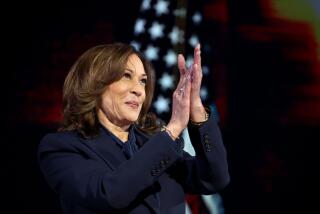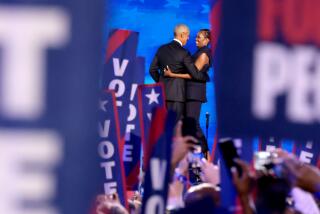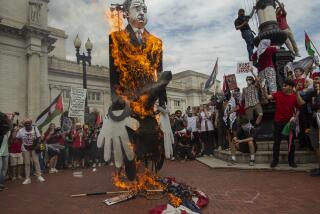Barack Obama and the March on Washington: Rhetoric and reality
President Obama’s commemoration of the 50th anniversary of the March on Washington underscored both the great advantages of the presidency and its daunting limitations.
A forum in which a president has to compete with the famously loquacious Bill Clinton and the ghost of Martin Luther King Jr. could make fearful any speaker, even the confident Obama. His effort did not carry the drama of King’s speech—a near impossibility—and also lacked some of the easy familiarity with which Clinton, a child of the segregated South, talked about the import of events 50 years ago.
Still, Obama did seize an opportunity, nationally televised, to extend and update the reach of the civil rights movement into current times, emphasizing its relevance to a nation which, if its black/white schisms are nowhere near healed, now finds itself riven along many more demographic and cultural fault lines.
Toward the end, in the first section of the speech that he attacked with visible ardor, Obama offered evocative praise and also upbraided both black and white Americans who “lost their way” over past decades. He implicitly blamed both blacks who had taken to citing poverty and bias for their troubles and whites who turned against government as part of the solution for the nation’s woes.
VOICES: The March on Washington
With that, and his assertion that the struggles of 50 years ago were echoed by those of women, Latinos, gays and others in present times, Obama sought to connect the entire country in what was essentially a re-statement of his rationale for running for president.
“Change does not come from Washington but to Washington,” he said to the thousands gathered on the Mall before the Lincoln Memorial, as hundreds of thousands had been all those years ago. “In the face of impossible odds, people who love their country can change it.”
But the limitations of leadership—and the conflicts forced upon leaders—also were fully evident. There was a lingering sense of the tightrope that Obama has always walked, between one role as a black man with an understanding of the community’s needs and another as president of an entire nation of polyglot demands. He treaded softly on two recent issues of racial impact—the killing of Trayvon Martin and moves in state legislatures to sharply curtail the right to vote, rules that strike African Americans profoundly.
That light touch is familiar: Obama’s positioning was similar to King’s own in 1963. The civil rights leader and his aides toned down a fiery speech that was to be given that day by now-U.S. Rep. John Lewis, concerned that it would drive off other allies in the civil rights coalition. (And, as King’s daughter noted from the stage Wednesday, President Kennedy may have supported civil rights but didn’t show up at the 1963 march.)
More to the point—though it went unmentioned by the president—the day demonstrated anew how events outside a president’s control can alter the course and focus of a presidency. On Wednesday Obama came to the celebration of King’s nonviolent pursuits even as his aides were laying plans for what is expected to be violent retaliation against Syria for its alleged use of chemical weapons.
FULL COVERAGE: The March on Washington
Bill Carrick, a Democratic political strategist based in California, noted that foreign policy, in particular, has overtaken the last three presidents—Clinton, flummoxed by the Balkans, and George W. Bush with Iraq and Afghanistan—even if they came into office with far different plans. In recent days, he noted, Obama tried to focus on domestic concerns.
“The irony is the president goes on a tour of smaller communities, talking about economic challenges…and then there’s the 50th anniversary of the March on Washington and all of that is taking secondary importance to ‘What is he going to do in Syria?’ “ Carrick said. “It’s the perfect extension of this whole trend.”
Obama may be used to such conflicts by now. He is, after all, a man cast by political opponents as a mealy mouthed peacenik who, as president, has greatly expanded the use of drones to kill perceived threats abroad and who has defended a level of national security intrusions into American’s privacy.
He is a president who, months after taking office, was awarded a Nobel Peace Prize—largely for his rhetoric and, the awarders said, for giving the world hope—and used his acceptance speech to offer a full-throated defense of military action. “A nonviolent movement could not have halted Hitler’s armies,” he noted.
In the end, the most significant part of Obama’s appearance at the March on Washington memorial may not have been anything he said or didn’t say. It may have been that he was there at all, a black president representing a continuum of advancement unimaginable 50 years ago.
PHOTOS: A look back at 1963’s March
“Because they marched, doors of opportunity and education swung open so their daughters and sons could finally imagine a life for themselves beyond washing somebody else’s laundry or shining somebody else’s shoes,” he said of the 1963 marchers. “Because they marched, city councils changed and state legislatures changed, and Congress changed, and, yes, eventually, the White House changed.”
Near him was a simple bell. It once had hung in the 16th Street Baptist Church in Birmingham, Ala., where less than a month after the first march a bomb went off, killing four girls. Before the president spoke, those on stage had rung the bell, time and again, for the living and for the dead.
Twitter: @cathleendecker
More to Read
Sign up for Essential California
The most important California stories and recommendations in your inbox every morning.
You may occasionally receive promotional content from the Los Angeles Times.











